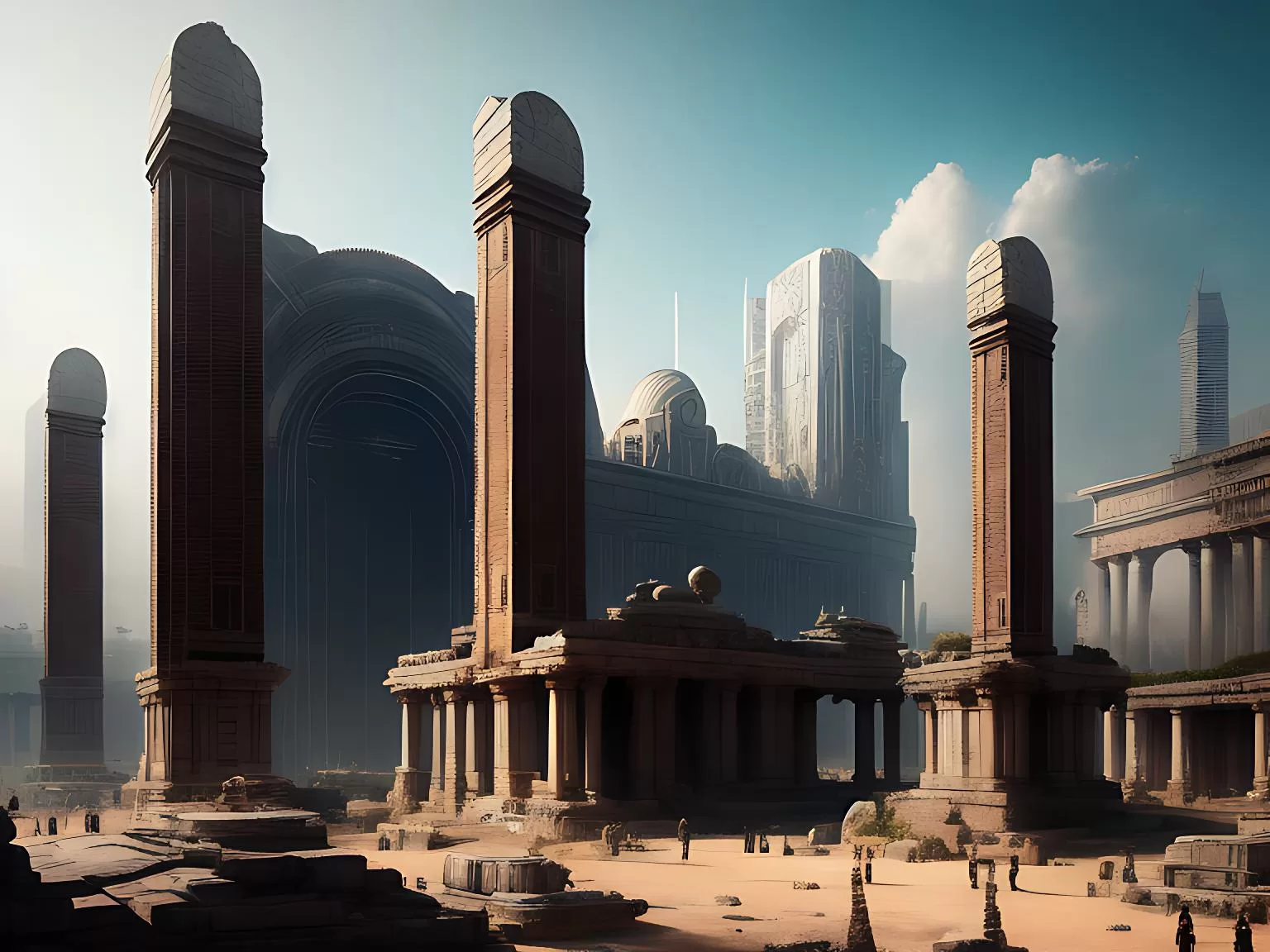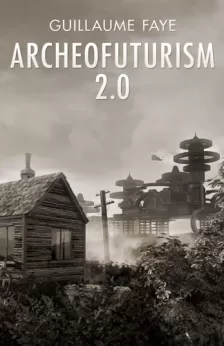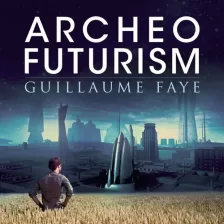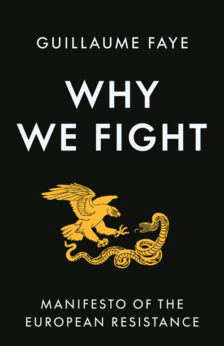Archeofuturism, Ethnofuturism, Paleofuturism, Metafuturism, and more…
I’ve said it before, and I’ll say it again – one of the things that I find most thrilling about the New Right, at least from an intellectual standpoint, is that it posits a number of intriguing and alternative visions of the future.
Now that isn’t to say that every one of these visions of the future is necessarily practical, or desirable, or likely to be implemented anytime soon…or at all, for that matter.
But that’s not really the point.
The point is that bold and brilliant minds are thinking about these things and possess the audacity to envision a new future – one that isn’t blinkered or straitjacketed by the tired futurisms of the past. After all, we’re quite familiar with the standard science-fictional techno-utopianism that often passes for futuristic thinking – the bland, almost cloyingly optimistic liberal-democratic and very millenarian futures sold to us in such fare as the Star Trek series and its endless knockoffs.
Nowadays, at least, it is in our prophecies of the future that we encode our hopes for the present; the liberal-democratic hope, as envisioned in Star Trek and its ilk, is for a post-scarcity, post-capitalist, post-racialist, and even post-speciesist society that is hyper-competent, ultra-intelligent, thoroughly domesticated and neutered, and wholly given over to an idealized form of scientism and anti-metaphysical atheism.
This is, undoubtedly, the fond hope of the card-carrying liberal-democrat for the present; reality as we have experienced it, to his great dismay (though he will never admit it), has proven this hope to be a vain, unattainable, and frankly absurd one. The result is that the Star Trek future – which in many ways reflects a kind of postwar, late-twentieth-century American society on steroids and taken to its extreme, utopian conclusion – has decidedly lost its luster.
So what alternative futures does the New Right offer us? That’s where things begin to get interesting.
In fact, it’s been interesting for a while, for many decades – if only one knows where to look. For instance, there were some on the Right who had no difficulty eschewing the false dichotomy of the capitalist American Empire and the Marxist Soviet Empire (the Western and Eastern Blocs) that characterized the Cold War years. The neo-Spenglerian firebrand Francis Parker Yockey, for one, envisioned an “Imperium” in which a fascistic Europe was reborn, Phoenix-like, from the ashes of the Second World War, to shoulder aside both America and Russia, and exert its unquestioned intellectual, cultural, scientific, spiritual, and political sway over the future:
The basis of Europe’s politics is faith in, but under no circumstances fear of, the future. If we follow the path prescribed by our instincts, our intelligence, and our inner imperative, whatever happens to us will be good. For us there is but one mistake, one dereliction, and one crime: to be untrue to ourselves, follow alien leaders, and hold alien ideals.
[…]Europe is equal to its Historic task. Against the anti-spiritual, anti-Heroic ideals of America-Jewry, Europe pits its metaphysical doctrine of faith in its Destiny and its ethical principle of Heroism. Fearlessly, Europe enters the struggle, for it knows it is armed with the mightiest weapon ever forged by History: the superpersonal Destiny of the European organism. The European mission is creating the Cultural, political, national Imperium of the West, and as part of this Historical process we shall perform such deeds, carry out such projects, and so transform our world that our most distant posterity, when they behold the remnants of our buildings and ramparts, will tell their grandchildren that a race of gods once dwelt on the soil of Europe.1
Now that’s some rousing stuff!
It’s also especially fascinating, since Yockey’s idea of the European Imperium in many ways presages the next contribution to a vision of the future as conceived from the perspective of the Right: “Archeofuturism,” that evocative term coined by Guillaume Faye, the versatile French thinker and former member of the Nouvelle Droite.
Archeofuturism can be seen as the next logical evolution, the twenty-first-century manifestation, of the metapolitical thinking underpinning Yockey’s Imperium or Jean Thiriart’s ideas of a Euro-Asian superstate. But it is also much more than that — it is an ideology, a way of thinking, and a dream for the future that is independent of any political realities.
Faye defines the concept in this fashion:
Archeofuturism: to envisage a future society that combines techno-scientific progress with a return to the traditional answers that stretch back into the mists of time. This is perhaps the true face of post-modernity, as removed from attachment to the past as it is from the foolish cult of ‘keeping up with progress:’ the harmonious union of the most ancient memory with the Faustian soul according to the logic of ‘and’ rather than ‘or.’ Intelligent traditionalism is the most powerful form of futurism — and vice versa. It is necessary to reconcile Evola and Marinetti, and do away with the notion of ‘modernity’ produced by Enlightenment ideology. The Ancients must be associated not with the Moderns but with the Futurists.
As the Nouvelle Droite noted, while the political and social structures of modernity are crumbling today, archaic ones are surfacing in all fields — a significant aspect of this phenomenon being the spread of Islam. Finally, the upheavals technological science — and particularly genetics—will cause in the future, like the tragic awakening to reality that is bound to take place in the twenty-first century, will require a return to an archaic mentality. Modernism increasingly appears as a form of attachment to the past. Yet it is not a matter here of embracing classic ‘traditionalism,’ which is tinged with folklore and yearns for a return to the past. Modernity has grown obsolete. The future must be ‘archaic:’ neither modern nor attached to the past.2
Faye goes on to imagine a new political dispensation in the future — a scenario where the earth is divided into great civilizational blocs or superstates. This would include “Eurosiberia,” comprising all of present-day Europe and Russia; a “Sino-Confucian” bloc in East Asia; an Indian polity; the Dar al-Islam, or Muslim Empire; Black Africa; North and South America as separate blocs; and finally a polity comprising the Pacific islands and peninsular Asia (presumably also including Australia and New Zealand).
But it is the type of society that exists in this future world of isolated ethnic power-blocs that demonstrates Faye’s Gallic genius and creativity:
Could we not imagine and foresee a scenario where most of humanity reverts to living in traditional societies that consume little energy, and are socially more stable and happy, while — in the context of globalisation — a minority continues to live according to the techno-industrial model? Might there be two parallel worlds in the future, the worlds of a new Middle Ages and of Hyperscience? Who would be living in each of these worlds, and in what numbers? All daring and creative thought must think the unthinkable. I believe that Archeofuturism, an explosive meeting of opposites, is the key to the future, simply because the paradigm of modernity is no longer viable on a global scale.
“In this perspective, it is necessary to reflect on the economic issue of autarchy for wide spaces (which may include Eurosiberia) and the moving beyond both socialism and liberalism, by reviving the idea of an organic economy of the Third Way that may be inspired both by genuine liberalism and genuine communitarian socialism. We must think about the ongoing transformation of economic systems into neo-feudal networks, and radically redefine the role of superior political authority, which must politically direct the economy, but not manage it. We must envisage great semi-autarchic blocs which may have different modes of production and consumption, and within which interlinked but diverse types of society and economy may exist. Could ultra-technological areas, connected to the global communications network, border with neo-archaic areas where the ways of life and production of traditional societies have been restored?3
This is Archeofuturism. In some ways, it seems to me that it is Faye’s attempt to work through a synthesis of the Traditionalism of René Guénon and Julius Evola with the techno-scientific wizardry of our day — without which no society can hope to any longer survive, at least as a geopolitically sovereign state. Perhaps it is a way of merging the metaphysics of the Ancients with the scientism of the moderns, always subordinating the latter, and complementing rather than competing with each other.
Perhaps.
There are further refinements to the idea as well. In the fascinating book Rebirth of Europe, we are presented with the concept of “Ethnofuturism” — a notion that marshals traditional metaphysics and ethnic nationalism to counter the harsh and dystopian future offered by globalization:
Ethnofuturism does not aim to turn time backwards; neither does it aim to create some kind of a utopia. Europe Reborn will be a new system that will carry the heritage and traditional principles of Europe and unite them with the most contemporary means. These traditional principles will be united with ethnic nationalism and innovative methods in the field of political and cultural struggle. The state would be decentralised, but integrated with the bonds of a common national identity and a new hierarchy.
…Ethnofuturism does not aim to ‘conserve’ old forms of our civilisation; rather it aims at tomorrow, projecting values and role models of the past onto the context of the future. We should not fear the challenges of technology and the powers it unleashes; rather we should use them to survive the fall of European civilisation and to step into a new era after the decline. Our new spring and our new culture of most authentic ancient values will be united with scientific methods and control over evolution of man himself.4
For the Ethnofuturist, there can be no conflict between metaphysics and the discoveries of science, for “[a]s traditionalists we know that the true Tradition already carries all the secrets of the universe within, and has done so since the beginning of time. Almost anything can be metaphysically integrated into it.”5
The result is a vision of the future that is both grandiose and breathtaking:
Ethnofuturist spirituality would be based on the ancestor cult as a myth that would be projected into the future as a great civilisational goal. This, combined with a goal to create a man and society of the future, would marry the ethnic and futuristic elements of spirituality, past and future. Overcoming the historical situation that we are in would mean not only the beginning of a new civilisation, but also the beginning of a new mankind as such.
This has to be a 21st century nationalism, and therefore different from the nationalisms of the previous centuries; but in its basis it is still the same… Mastering its demographic processes and not leaving them in the hands of liberals, the new Europe will actually be able to economically and culturally compete with the rest of the world. Only then can we see our future — exploring the galaxy and discovering the secrets of quantum mechanics…
[…]In the springtime of any new civilisation, it constantly seeks the unknown for its exploration and discovery. For the future Europeans, this can again be provided by technology. They will be able to map the outer reaches of the Solar System and go beyond, sail towards new worlds, toward the same stars our ancestors saw in their night sky. Meeting the unknown will inevitably bring us back to spirituality, similar to ancient times. Quantum mechanics have already reached a point that can only be passed by leaving rationality behind. The observer effect, which touches on the relationship of a being with its surroundings, and the inexplicable emptiness that lurks in the very fabric of all matter, are examples of this.6
The rhetoric is lofty, but so are the aspirations; despite their self-assumed mantle of “progressivism,” and their oft-laid claims to speak for the future, leftism and liberal democracy have proven to be the very opposite of this — stale, musty with the reek of old Victorian ideas, incapable of adapting to new realities and bewildered before a future they had always believed was their own special preserve, but which is now inexorably slipping through their fingers.
Whether it’s Yockey’s Faustian European Imperium, or Faye’s Archeofuturism of uneasily coexistent hyperscience and medievalism, or an Ethnofuturism that rejects sentimental attachments to the past and bravely confronts the future, to discover therein a new spirituality and a new evolutionary destiny among the stars, the Right is positing strange and wondrous new visions of the shape of things to come.
Maybe someday I’ll wade into the fray with my own “-futurism,” and call it “Paleofuturism” — a futurism informed by the immemorially ancient, antehuman past — or “Metafuturism” — a futurism so profound and philosophically sophisticated that it is practically indistinguishable from Traditionalism. But that’s a long way off yet, and I’m content for the time being to explore these exciting new visions of the future that are being published by the up-and-coming thinkers of the New Right.
I have no idea if any of them will someday be realized, but I suppose each contributes in its own way to the important task of human society collectively shrugging off the fetters of the liberal-democratic notions of the future that have so stifled and blinkered our way of thinking, and for far too long.
And I guess that’s one step closer to attaining the sort of future they envision…
Footnotes
1Francis Parker Yockey, The Enemy of Europe, trans. Thomas Francis & F. Roger Devlin (Centennial Edition Publishing, 2022), pg. 114.
2Guillaume Faye, Archeofuturism: European Visions of the Post-Catastrophic Age (Arktos Media, Ltd.: Kindle Edition, 2010), pp. 45-6.
3Ibid., pp. 49-50.
4Ruuben Kaalep and August Meister, Rebirth of Europe: The Ethnofuturist Manifesto (London: Arktos Media, Ltd., 2020), pp. 27-8.
5Ibid., pg. 44.
6Ibid., pp. 42-4.











[…] cannot be reclaimed by the Right, even including the ambivalent innovations of technology. In my previous article, I spoke about some Rightist visions of the future — Guillaume Faye’s Archeofuturism for […]
Faye continues to be a source of inspiration. I remember when I first read Archeofuturism and I was blown away because I’ve never read anything like it.
This is the kind of vision we need more of!
Very remarkable writing! I hope he becomes a regular contributor here at Atkos!